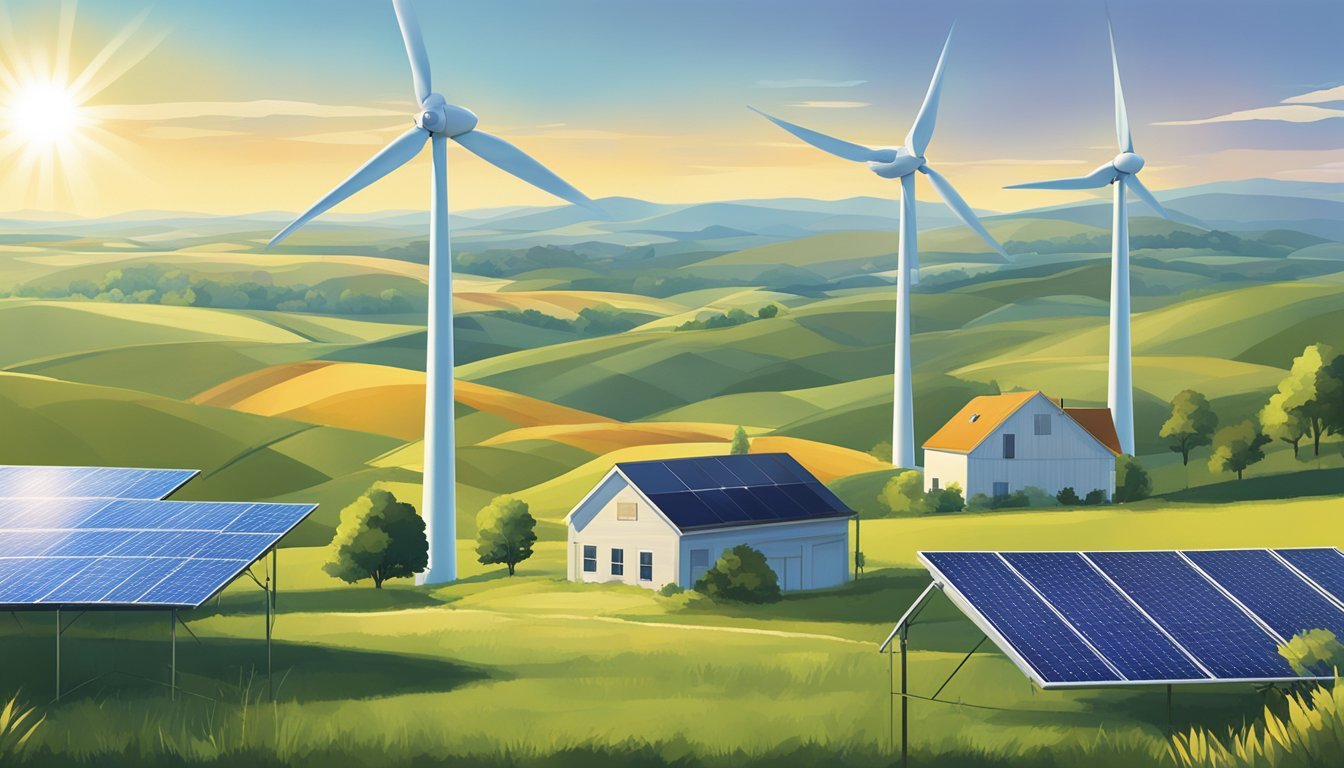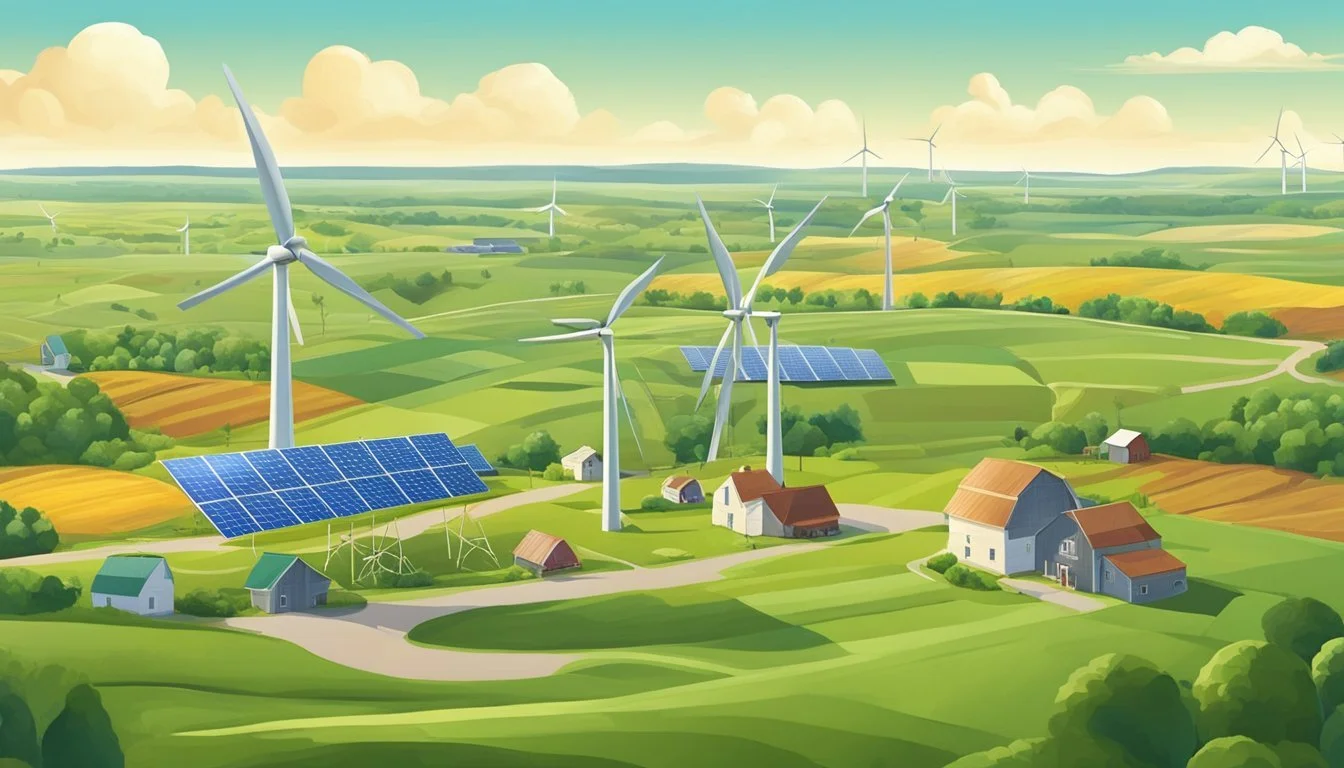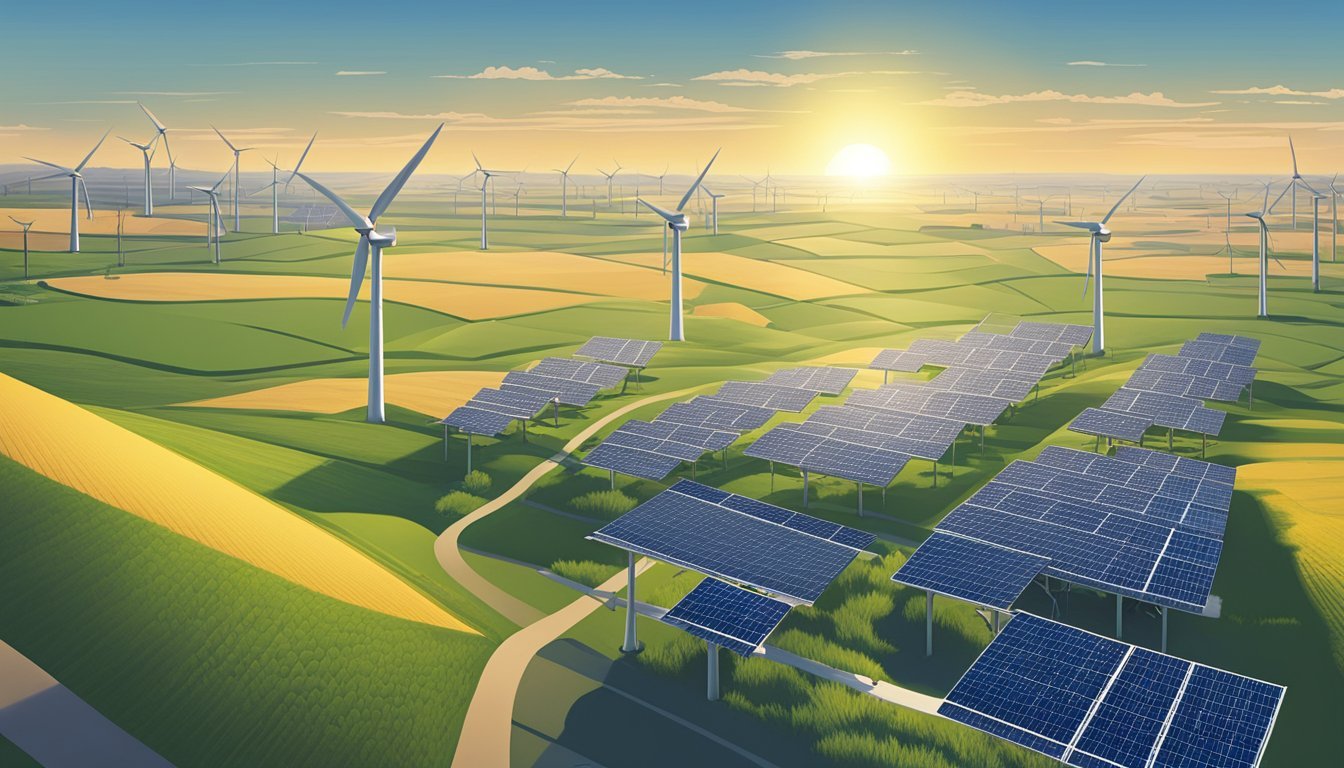Incentives for Renewable Energy and Conservation in Kansas
Boosting Sustainable Practices
Kansas stands at the forefront of renewable energy, harnessing the relentless winds that sweep across its expansive plains. As the leading state in wind energy potential, the commitment to renewable power is further reinforced by a suite of incentives designed to encourage the adoption of sustainable practices. These incentives not only propel homeowners and businesses towards energy efficiency but also cultivate a robust landscape for renewable energy systems.
The state supports a range of programs aimed at rural energy advancement and environmental conservation. Initiatives like the Rural Energy for America Program Grant (REAP Grants) offer financial assistance to small businesses in rural Kansas, promoting energy audits, energy efficiency improvements, and the installation of renewable energy systems. In the broader push for sustainability, the Kansas Department of Commerce is active in advocating for energy and natural resources, while the Environmental Quality Incentives Program (EQIP) assists producers in implementing practices that yield cleaner water and air, healthier soil, and better wildlife habitats.
Moreover, the Inflation Reduction Act (IRA) fortifies the financial landscape for Kansas homeowners, availing them of significant rebates for enhancing home energy efficiencies. This concerted effort underscores Kansas' commitment to renewable energy and conservation, ensuring that its residents and businesses not only thrive in the short term but also contribute to the long-term sustainability of the state's environment.
Overview of Kansas' Renewable Energy Landscape
Kansas is rapidly becoming an influential player in the renewable energy sector, driven by its extensive wind energy resources and supportive legislative framework. The state's commitment to renewable energy is evidenced by its standards and the role of the Kansas Corporation Commission in regulating and advancing energy initiatives.
Renewable Energy Resources in Kansas
Kansas is renowned for its wind energy capabilities, ranking high among states for wind power generation and potential. As the #1 source of electricity in Kansas, wind energy contributes significantly to the state's energy mix, with over 6,100 megawatts of installed capacity. In addition to wind, Kansas is exploring other renewable resources such as solar power and biomass to diversify its energy portfolio.
Legislation and Renewable Energy Standards Act
The Renewable Energy Standards Act sets a voluntary goal for 20% of a utility's peak demand to be generated from renewable sources by 2020. Although this goal is not mandated, it reflects a strong governmental intent to encourage the use of renewable energy. The Act recognizes eligible renewable sources that include not only wind and solar power but also dedicated crops grown for energy production.
Role of the Kansas Corporation Commission
The Kansas Corporation Commission is instrumental in overseeing the state's energy policies. It is responsible for the implementation of various programs and incentives designed to increase energy efficiency and promote renewable energy. The Commission plays a vital role in working with homeowners, businesses, and rural areas, offering tax credits, rebates, and savings through initiatives like the Rural Energy for America Program Grant.
Incentive Programs for Renewable Energy
In Kansas, individuals and businesses can leverage various programs to make renewable energy more affordable. These programs include federal tax incentives, state-level rebates, and utility-sponsored initiatives, each designed to reduce the initial investment for renewable installations.
Federal Incentives: Investment Tax Credit and PTC
The Investment Tax Credit (ITC) and the Renewable Electricity Production Tax Credit (PTC) are two significant federal incentives promoting renewable energy adoption. The ITC allows for a deduction of a percentage of the cost of installing a renewable energy system from federal taxes. Similarly, the PTC provides a per-kilowatt-hour tax credit for electricity generated by renewable energy resources, which, depending on the project's start date, may vary in percentage.
ITC: Allows for a 26% tax credit for solar photovoltaic and solar water heating systems installed by December 31, 2022. It steps down to 22% for systems installed in 2023.
PTC: Offers a credit per kilowatt-hour of renewable electricity produced for the first ten years of a facility's operation.
For more information and updates on federal incentives, individuals can visit the Department of Energy's guide on financing and incentives.
State-Level Incentives and Rebates
Kansas provides incentives at the state level that complement federal programs, encouraging investment in renewable energy within the state. While specific incentives can vary, they often include rebates for solar panel installations and energy-efficient appliances. The state government occasionally partners with local entities to provide funding for renewable energy projects, aiming to reduce overall energy consumption and promote green initiatives.
State Rebates: Some Kansas local governments offer rebates or tax incentives for energy-efficient upgrades or renewable installations.
State Grants: Occasionally, opportunities for grants in renewable energy are available through state programs, supporting a range of projects from solar installations to wind farms.
Utility-Sponsored Incentive Programs
Utilities in Kansas also play a role in incentivizing renewable energy through various programs. These can include net metering policies, where consumers who generate their own electricity can receive credits for surplus power returned to the grid. Additionally, utilities might offer their own rebates or incentive programs for customers installing renewable energy systems, further reducing the overall costs of these systems.
Net Metering: This policy allows residential and commercial customers to offset their energy costs by sending excess renewable energy back to the grid.
Utility Rebates: Some utilities provide rebates for installing energy-efficient appliances or renewable energy systems, making upgrades more accessible to a wider range of customers.
Renewable Energy Technologies
In Kansas, the renewable energy landscape is driven by advanced technologies in solar and wind power, as well as ongoing developments in biomass, bioenergy, and geothermal solutions. The state harnesses these resources to support its energy needs and environmental goals.
Solar Energy Systems and Wind Farms
Kansas has embraced solar energy systems and wind farms as cornerstone technologies for renewable power generation. Companies like Siemens Gamesa Renewable Energy have been pivotal in supplying advanced turbines for wind farms, which are prevalent across the state due to Kansas's high wind potential. Meanwhile, solar systems are increasingly popular for both residential and commercial applications, contributing to the state's energy diversification.
Biomass, Bioenergy, and Alternative Fuels
Biomass and bioenergy initiatives are essential components of Kansas's renewable energy program. Utilizing agricultural by-products and dedicated energy crops, Kansas is producing renewable fuels that reduce dependence on fossil fuels. These alternative fuels not only provide energy but also promote a circular economy by reusing waste materials.
Geothermal and Hydropower Solutions
Though less prominent than wind and solar, geothermal energy provides a stable and continuous power source for Kansans. It harnesses the Earth’s heat for both electricity generation and direct-use applications. Hydropower, though limited by geographical constraints, also contributes to Kansas's renewable energy mix, providing a clean and reliable source of energy from water resources.
Benefits of Investing in Renewable Energy
Investing in renewable energy in Kansas not only promotes sustainable practices but also offers tangible benefits from economic growth to environmental preservation. Entities from consumers to corporations can leverage this investment, realizing both short-term and long-term advantages.
Economic and Environmental Advantages
Renewable energy initiatives have proven to provide significant economic development for Kansas, including the creation of jobs and capital investment in local communities. These investments stimulate the economy through the development of new technology and the construction of energy infrastructure. Moreover, renewable energy projects increase efficiency in energy production and consumption, often leading to decreased operating costs. The environmental benefits are equally notable, with renewable sources such as wind and solar reducing the reliance on fossil fuels, lowering greenhouse gas emissions, and helping to preserve Kansas's natural resources.
Impact on Consumers and Homeowners
For consumers and homeowners, investing in renewable energy translates to direct savings on energy bills through financial incentives such as tax credits and rebates. Additionally, renewable technology like solar panels increases a property's value and offers energy independence to homeowners. This shift towards more sustainable energy sources ensures that homeowners are not only part of a greener future but also benefit financially from their choice.
Local and Global Corporate Sustainability Goals
Corporations operating in Kansas are aligning with corporate sustainability goals, striving to meet both local mandates and global commitments to carbon neutrality. By investing in renewable energy, these companies demonstrate leadership in corporate responsibility, often gaining competitive advantages through improved brand reputation and stakeholder trust. Financial incentives available for businesses encourage the adoption of renewable systems, decreasing long-term operational costs through improved efficiency and hedging against future energy price volatility.
Support for Agricultural and Rural Communities
In Kansas, agricultural producers and rural communities are receiving significant support for implementing renewable energy systems and conservation practices. These initiatives are bolstered by grants and assistance from the Department of Agriculture to enhance rural energy infrastructure and promote sustainable agriculture.
Role of the Department of Agriculture
The Department of Agriculture plays a crucial role in facilitating a move towards more sustainable practices among agricultural producers and rural businesses. Through guidance and funding, the department supports the adoption of technologies that convert waste heat to energy and other renewable energy systems that contribute to energy independence and sustainability.
Notable efforts include a hands-on approach to assist farmers in applying for programs like the Rural Energy for America Program (REAP), as highlighted by a recent announcement regarding such support made available due to legislative actions such as the Inflation Reduction Act.
Grants for Agricultural Producers and Rural Energy
Grants serve as a cornerstone of the strategy to incentivize the adoption of renewable energy and efficiency improvements. The REAP grants, for instance, assist agricultural producers and small rural businesses in both the installation of renewable energy systems and the undertaking of energy efficiency measures.
Funding opportunities worth over $2 billion have been allocated to support these initiatives through 2031, which represent a substantial investment in the future of rural energy infrastructure and the sustainability of agriculture in the state of Kansas.
Challenges and Considerations
In Kansas, the transition to renewable energy and sustainable practices is accompanied by specific challenges. These obstacles, such as the complex permitting process and growing demands on infrastructure, must be navigated carefully by stakeholders to ensure successful implementation.
Permitting Process and Regulatory Compliance
The permitting process for renewable energy projects can be intricate, especially in cities like Wichita and Merriam. Developers must comply with local, state, and federal regulations, which frequently requires a significant investment of time and resources. Sedgwick County has its own set of standards that must be aligned with broader guidelines, making the process even more daunting. Ensuring compliance is critical to avoid delays and additional costs that can hinder project progress.
Infrastructure and Grid Capacity
Kansas' infrastructure must adapt to support the growing influx of renewable energy sources. Current grid capacity may not always be sufficient to handle the increased load, particularly in rapidly expanding areas. The integration of renewable energy, such as wind power, necessitates investments in grid upgrades and the development of new transmission lines to maintain reliability and efficiency.
Safety and Environmental Concerns
Safety and environmental considerations are paramount. Local governments in Kansas, including those in Sedgwick County, are focused on protecting their communities and local ecosystems from adverse effects. Ensuring the safety of both workers and residents during the construction and operation of renewable energy facilities is a major concern. Moreover, thorough environmental assessments are conducted to ensure that renewable projects do not negatively impact local habitats and wildlife.
Practical Guide to Implementation
Navigating the opportunities for renewable energy and conservation in Kansas can be greatly advantageous for homeowners and businesses alike. Key aspects include comprehending the application process, installing the right equipment, and implementing energy efficiency improvements.
Understanding the Application Process
The application process for renewable energy incentives in Kansas is a critical first step for interested parties. One begins by identifying the appropriate Program such as the Inflation Reduction Act incentives which offer significant rebates for home energy. Thoroughly reviewing the requirements on the Kansas Corporation Commission website ensures applicants understand the necessary documentation and deadlines, leading to a smooth application process.
Installing Renewable Energy Equipment
When it comes to Installing Renewable Energy Equipment, selecting the correct equipment is paramount. For businesses in rural areas, the Rural Energy for America Program Grant (REAP Grants) supports energy audits and installations. Applicants must ensure that the equipment is eligible under the specific program and meets the Kansas energy office standards for renewable systems.
Energy Efficiency Improvements for Home and Business
Making Energy Efficiency Improvements for Home and Business involves both identifying potential upgrades and understanding the financial incentives available. Kansas offers programs such as the Facilities Conservation Improvement Program (FCIP) which is recognized by other states for its effectiveness in implementing energy efficiency improvements. Detailed knowledge of these incentives helps maximize savings while contributing to conservation efforts.
Incentivizing Renewable Energy Utilization
Kansas has implemented various programs to encourage the adoption of renewable energy sources. These programs are essential for promoting sustainable energy practices and reducing reliance on non-renewable resources.
Net Metering and Electricity Generation
In Kansas, net metering policies allow residential and commercial customers who generate their own electricity from renewable energy sources to feed excess power back into the grid. Net metering is crucial as it provides a financial benefit for those who invest in an energy system, like solar panels, by offsetting the cost of electricity drawn from the utility.
Renewable Portfolio Standard (RPS) and Its Impact
The Renewable Portfolio Standard (RPS) mandates that a certain percentage of electricity sold by utilities must come from renewable sources. In Kansas, this standard sets a goal for renewable energy generation, which helps to drive investment in renewables and encourages diversity in energy sources. The impact of RPS is significant in promoting clean energy and ensuring a long-term commitment to energy conservation.
Certificates and Renewable Energy Credits (RECs)
Renewable Energy Credits (RECs) represent the environmental attributes of the power produced from renewable energy projects. Utilities and companies can purchase RECs to meet the RPS obligations or to claim green credentials. By doing so, they incentivize the generation of renewable energy and support the growth of the industry. Certificates serve as an essential tool for tracking progress and encouraging the expansion of renewable projects.
Future of Renewable Energy in Kansas
Kansas shows a promising trajectory in renewable energy with a focus on expanding wind and solar projects, harnessing advancements in technology, and capitalizing on federal incentives.
Advancements in Renewable Technologies
Renewable energy in Kansas is on the brink of expansion, bolstered by advancements in wind and solar technologies. Wind development has been particularly significant; the state benefits from a high wind energy potential, which is increasingly being tapped by more efficient wind turbines. On the solar front, photovoltaic (PV) systems are improving, offering Kansas an opportunity to diversify its renewable energy portfolio.
The Influence of the Inflation Reduction Act
The Inflation Reduction Act presents a pivotal moment for renewable energy in Kansas. It introduces tax credits and savings that incentivize both individuals and businesses to invest in renewable energy sources. The act is expected to drastically increase the uptake of renewable installations across the state, thereby asserting a positive influence on both solar energy and wind projects.
Prospects for Energy Storage and Emerging Sectors
The future of renewable energy in Kansas also hinges on the integration of energy storage solutions. Effective storage is essential for managing the intermittent nature of wind and solar energy. Emerging sectors such as fuel cells, hydrogen, and methane capture technologies present additional avenues for diversification and innovation within the state's energy landscape. As these technologies evolve, they are poised to play a critical role in enhancing the reliability and efficiency of Kansas's renewable energy systems.











